Nov 18, 2024 – Happy Dialogue (1) Jeju
Hello. Today is the day of the tenth Dharma Q&A lecture of Happy Dialogue 2024, held in Jeju Island.
After completing his morning practice and meditation, Sunim had breakfast at the lodging and headed to Gyorae Natural Recreation Forest at 8:50 AM. He decided to explore a well-preserved natural area while in Jeju. The weather was good, and Mount Halla was clearly visible through the car window.

After driving for 1 hour and 30 minutes, he arrived at Gyorae Natural Recreation Forest at 10:20 AM.
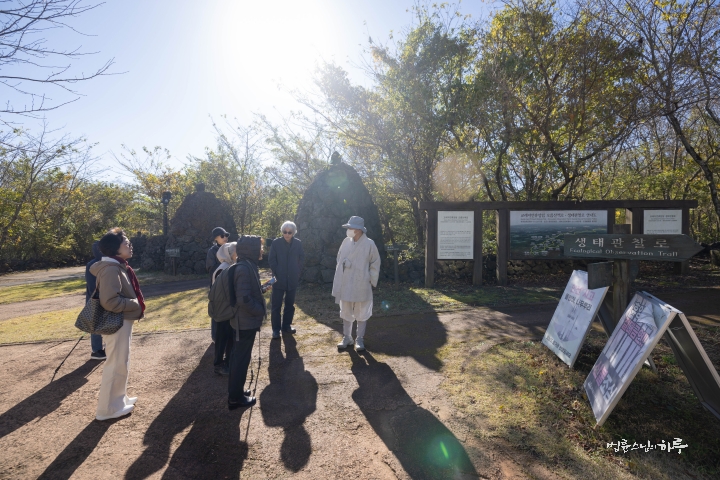
The Gotjawal Forest Trail in Gyorae Natural Recreation Forest is said to be the only trail in the country that utilizes the Gotjawal formed by volcanic eruptions. The untamed nature, rocks, stones, and tangled trees were preserved in their natural state.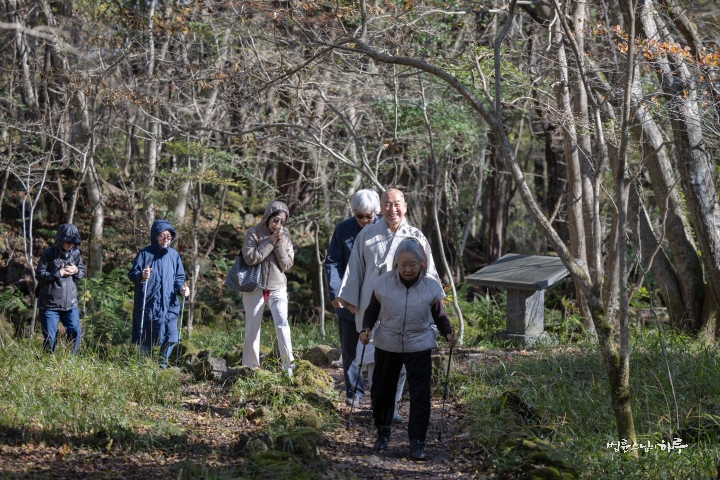

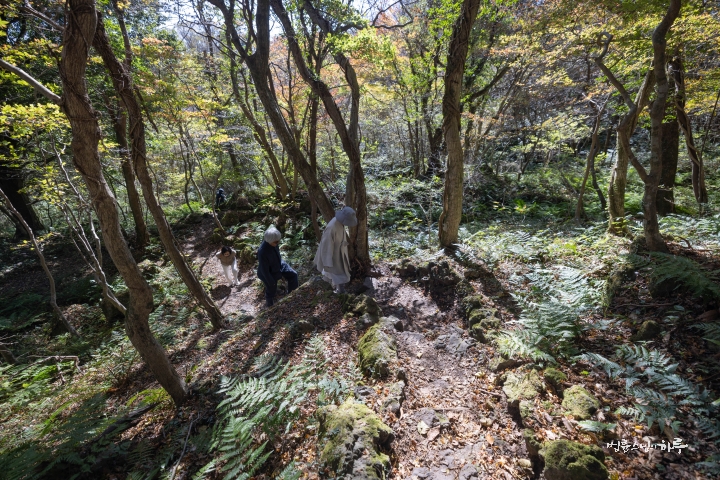

The gentle slope made it easy for Sunim to walk even with his knee pain.

“We’re enjoying autumn while walking on fallen leaves.”
Trees that had lived for many years and died lay like mummies, and thick vines wrapped around large trees like snakes. The various shapes of trees and plants evoked a sense of mystery.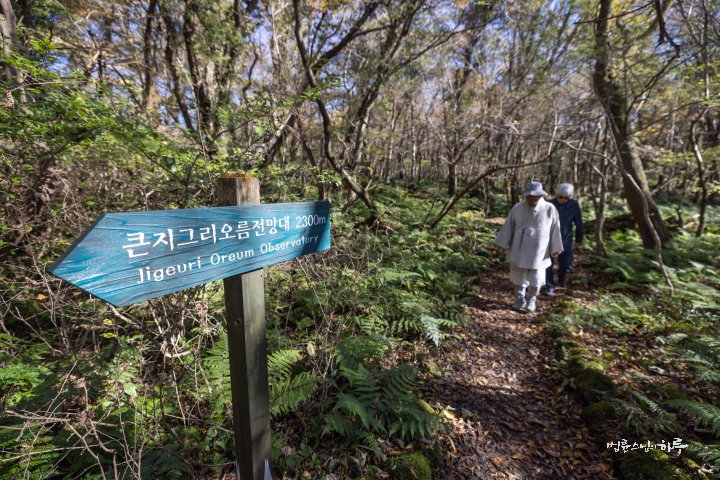
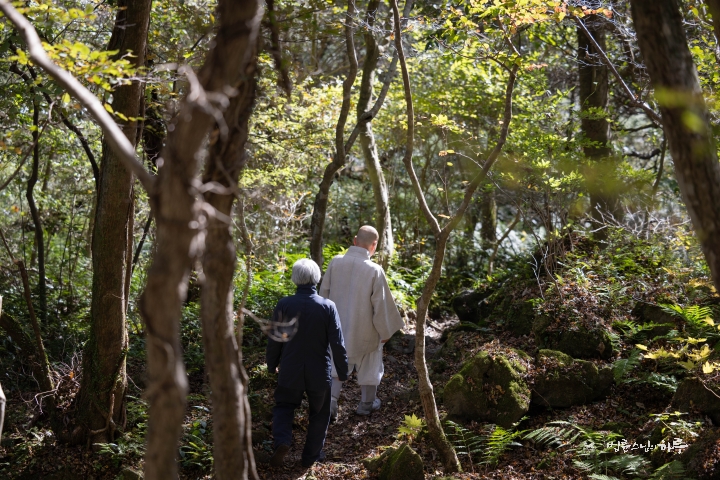
Although they intended to go to the oreum (volcanic cone), the path became increasingly difficult. They went halfway, about 2,000 meters, and returned to the entrance after two hours.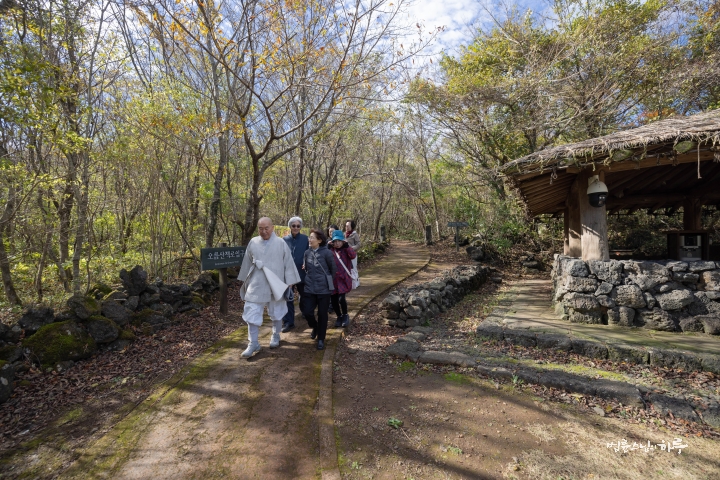
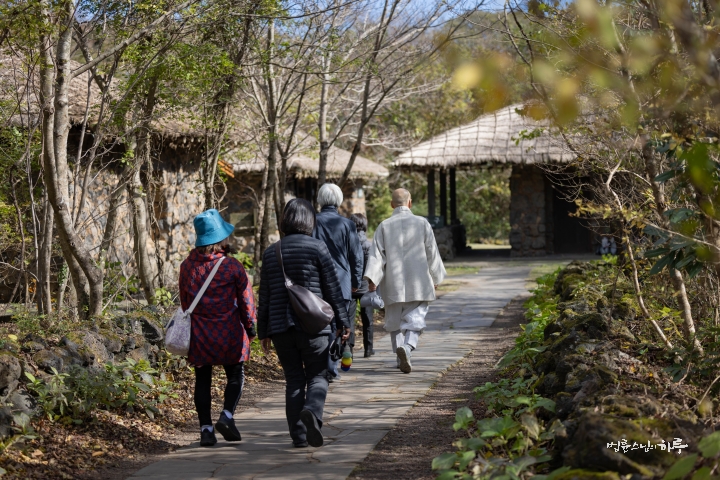
After the exploration, they had a simple bowl of janchi guksu (banquet noodles) at a nearby restaurant past noon, then headed to Jeju Seongeup Folk Village.

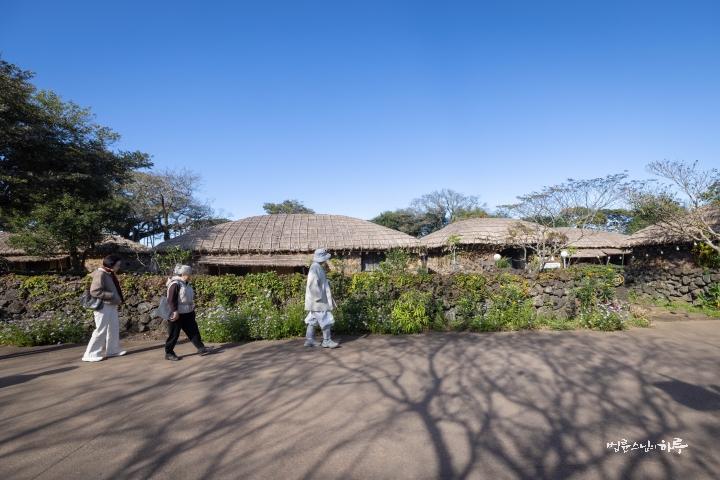
It is said to be a place where the appearance of an old Jeju village is preserved as it was. The stone walls and stone houses clustered together well represented the unique characteristics of Jeju Island.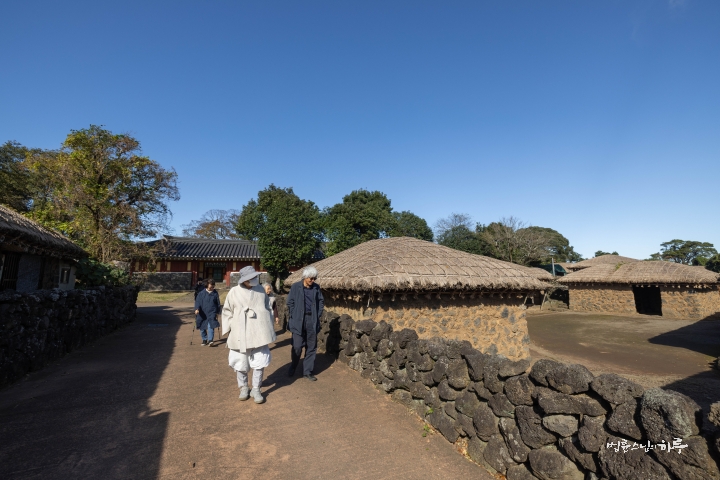
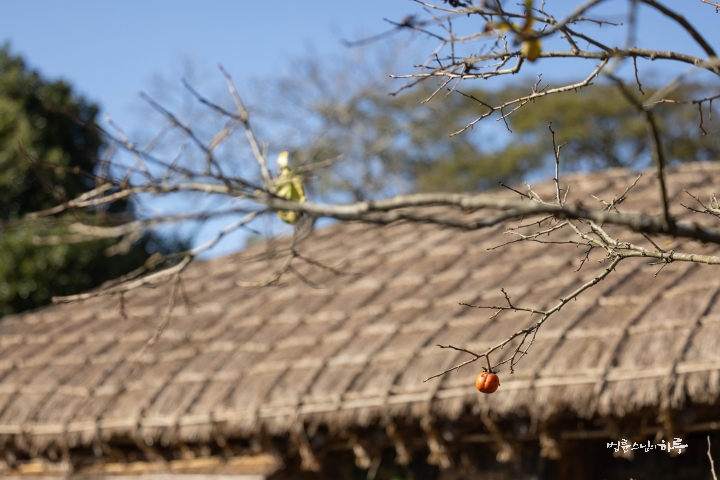

After looking around the tranquil autumn scenery of Seongeup Village, they drove to Pyoseon Beach. As soon as they got out of the car, the strong wind characteristic of Jeju Island enveloped their entire bodies. The wind was too strong to stay long, so they got back in the car. Driving along the coast, they took in the blue sea. Even from inside the car, they could deeply feel Jeju’s autumn with the white spray crashing against the black basalt rocks and the silver grass dancing under the autumn sun.
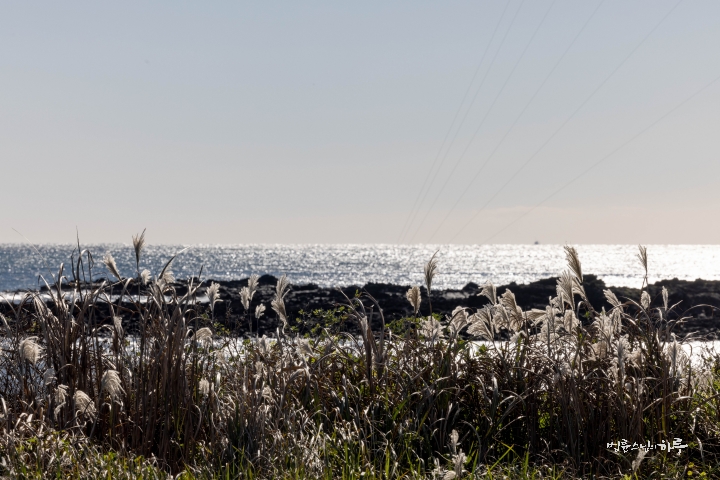
After enjoying the sea view on their walk, and spending a leisurely time for the first time in a while, they returned to the accommodation at 4 PM.

After resting briefly at the lodging and having dinner, they left for the lecture hall at 5:50 PM.
Today is the first offline Dharma Q&A lecture in Jeju since the COVID-19 pandemic. The lecture is being held at the Halla Art Hall Grand Theater located within Halla University in Jeju City.
As Sunim arrived, volunteers were warmly welcoming Jeju citizens all around the lecture hall. About 30 happy citizens who graduated from the Happiness School at the Jeju Happiness Center helped prepare for the lecture.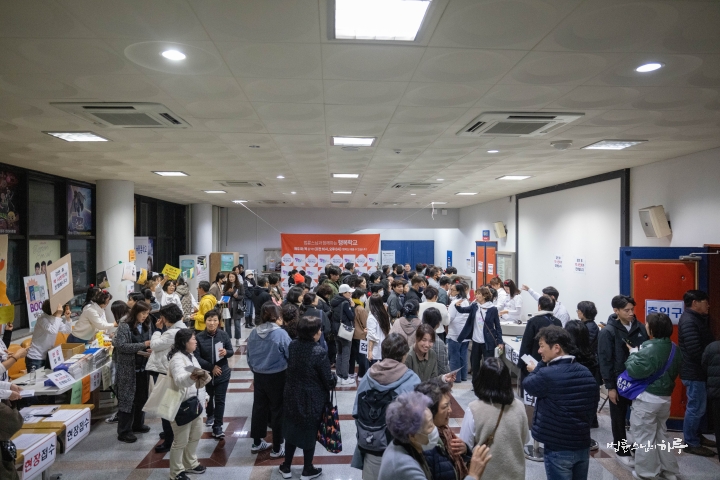
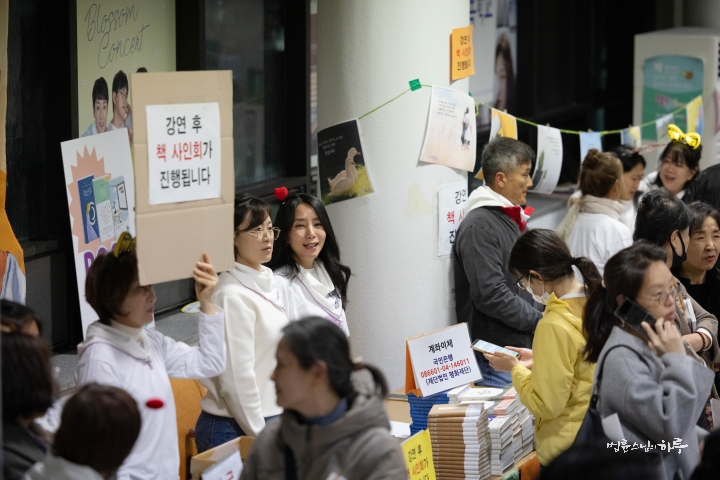
Arriving at the lecture hall at 6:50 PM, Sunim had tea with guests in the waiting room. First, Dharma teacher Bosu and Ms. Kang Jae-yeon and her husband came to greet Sunim. Ms. Kang Jae-yeon and her husband are the couple who initially established Jungto Society in Jeju.
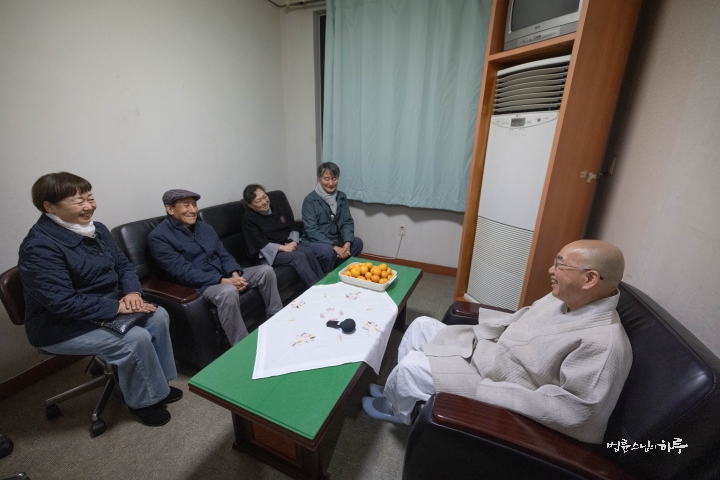
Then, President Yoon Du-ho from Jeju BBS (Buddhist Broadcasting System) came to talk. The president thanked Sunim for being able to run the radio program featuring Ven. Pomnyun Sunim’s Dharma talks in the Jeju dialect.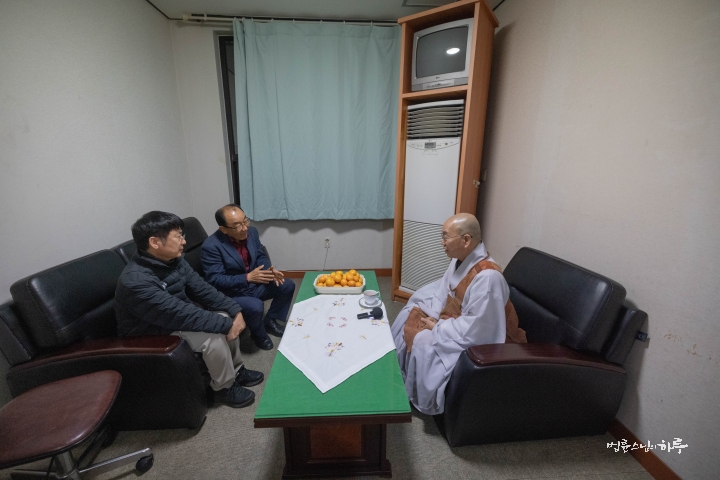
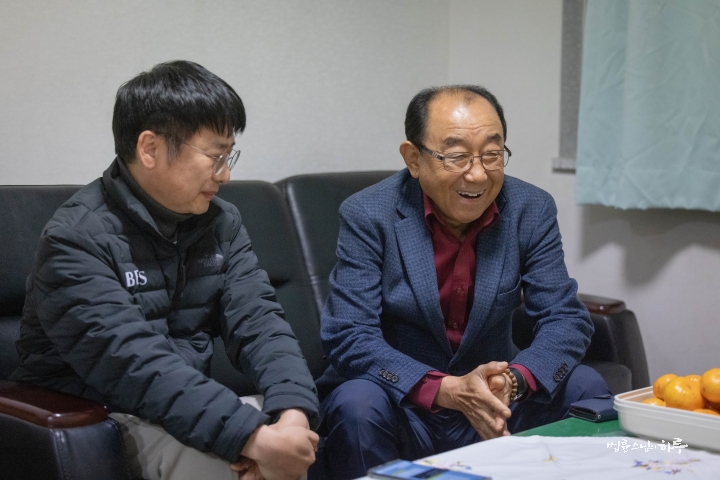
“We are running a radio program that translates the content of your books into the Jeju dialect, and the listeners’ responses were very positive. Thank you for allowing us to do this.”
“Can young people understand the Jeju dialect, or is it only understood by the elders?”
“Because it’s meant to preserve the Jeju dialect, young people are also responding very well.”
The president played Ven. Pomnyun Sunim’s Dharma talk recited in the Jeju dialect directly from his phone.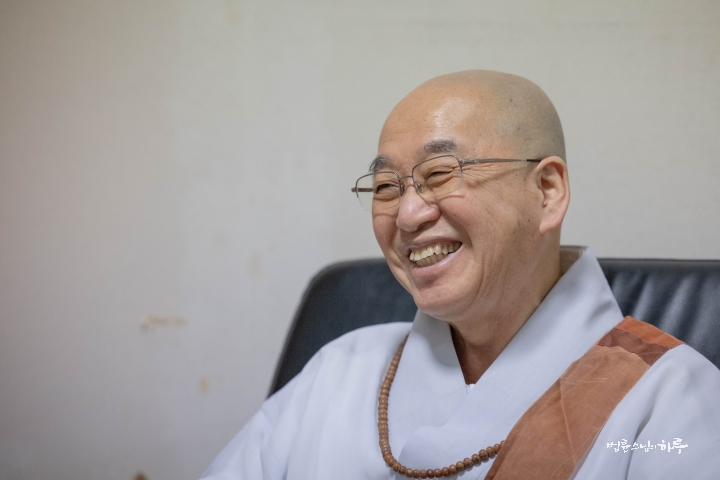
After the tea talk, they took commemorative photos and moved to the lecture hall together. In the lecture hall, the indie band Magic Donkey was performing lively songs as a pre-show. The audience responded enthusiastically to the song lyrics filled with humor and satire.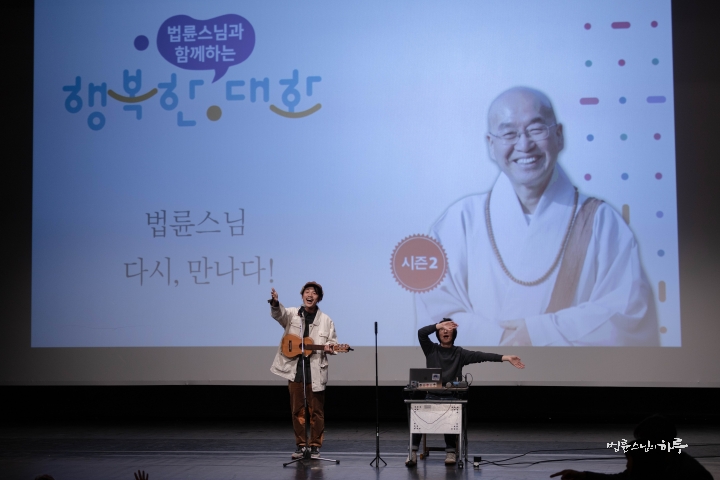
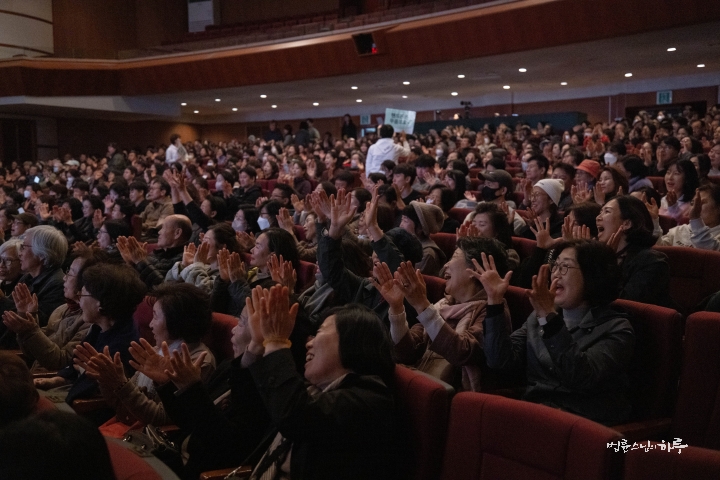
After the exciting performance, they watched a video of Sunim’s recent visits to Syria, which is suffering from war and earthquake damage. Then, they watched a video of his visits to Bhutan, which is pursuing sustainable development.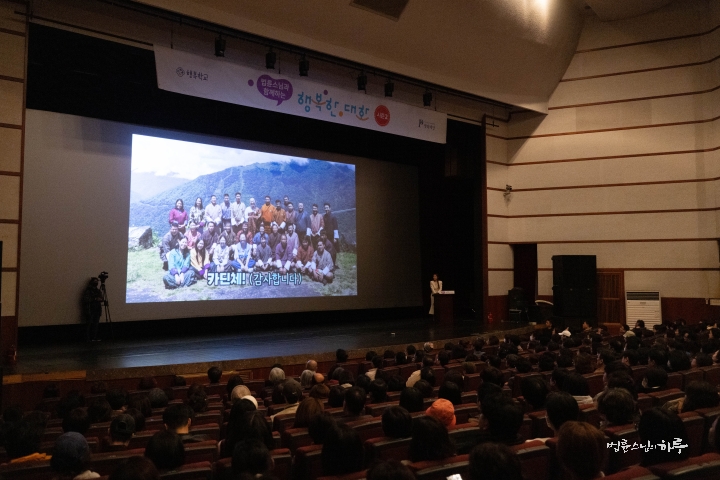
After the video ended, Sunim walked onto the stage amid cheers and applause. About 800 people filled the auditorium.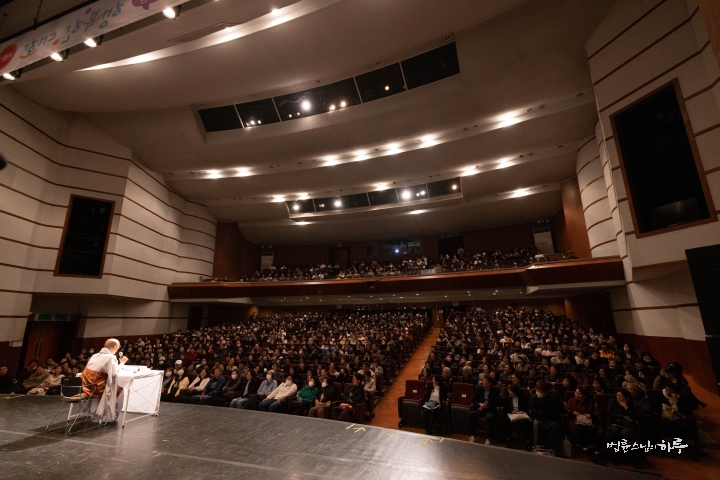
First, Sunim greeted the Jeju citizens.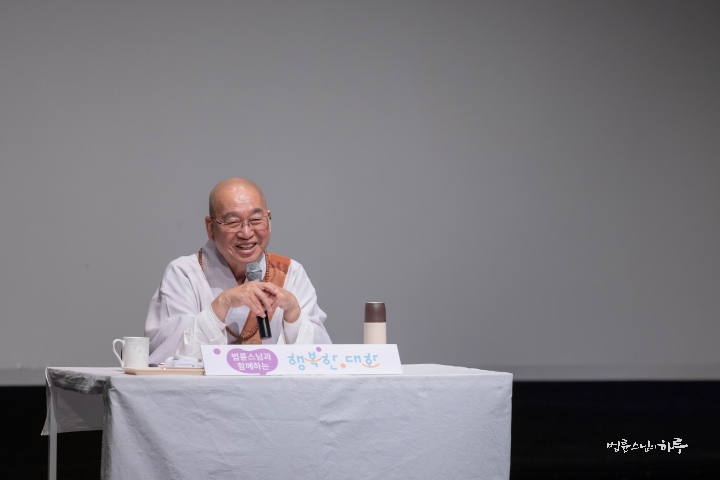
“You’ve just watched the video, right? Because we use water so freely, we don’t realize how precious it is. Also, because we have excess food, we don’t realize how valuable food is. We wear clothes abundantly, so we don’t know how precious clothes are. However, in many parts of the world, there are still too many people who lack the minimum water, food, and materials necessary for survival. In northwestern Syria, there are about 3.5 million internally displaced people. The civil war has been going on for over 10 years, and children in refugee camps are not receiving school education. As we saw in the video just now, over 500,000 young children are not receiving school education. While some children have the opportunity to receive education in schools that have been restored after being destroyed by earthquakes, children in refugee camps don’t have access to school education at all. So, I’m also doing a lot of research on how to solve this problem.”
“When you visit these war-affected areas, you can see how much damage war causes and how much suffering people endure. Currently, South Korea is widely known and highly regarded around the world. But what do you think people around the world are most worried about regarding Korea? I often receive calls from abroad asking if there might be a war. Right now, South Korea is at high risk of war. However, it seems that people living in South Korea are not very worried. Are you worried?”
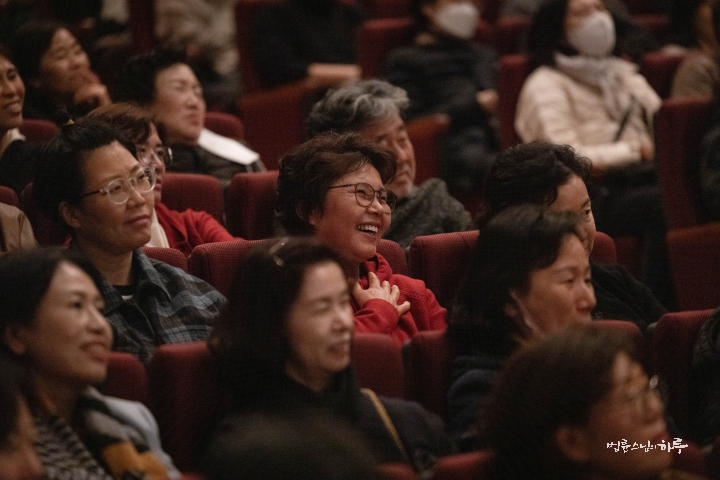
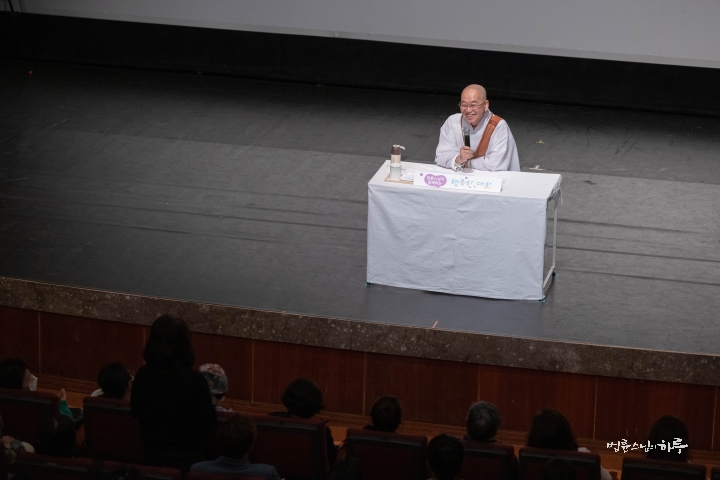
“While we may not worry about war, when viewed from the perspective outside our country, we are living in a place with a high risk of conflict. Therefore, all of our citizens should share the common understanding that war must not happen. Even if unification is delayed due to conflicts, war is absolutely unacceptable. This awareness must be firmly held by all our citizens. However, as most people who experienced the Korean War have passed away, and those without war experience remain. It seems some people are starting to think, ‘Well, what’s the big deal if we go to war?’ War is not about winning or losing. The damage of war goes beyond human casualties and injuries; it destroys much of the infrastructure and assets we’ve built over time. Look at Israel’s bombing of Gaza, the bombing of Lebanon, and Russia’s bombing of Ukraine. Don’t you see how cities are being obliterated? Everything is destroyed, resulting in tremendous damage. Therefore, I hope all of us can maintain a firm stance that war must never occur on this land again.”
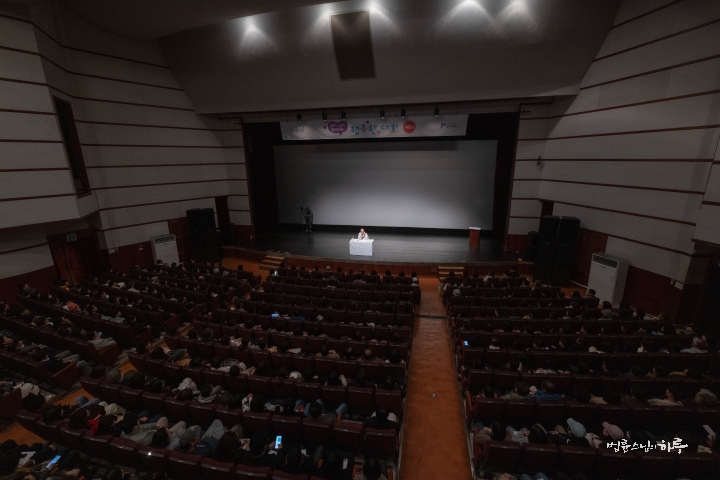
Following this, five people who had submitted questions in advance engaged in a dialogue with Sunim, after which impromptu questions were taken from the audience. Over the course of two hours, eight people asked questions to Sunim.
Today’s session featured many interesting questions that are not typically encountered in online lectures. One participant expressed frustration about her husband buying too many second-hand items.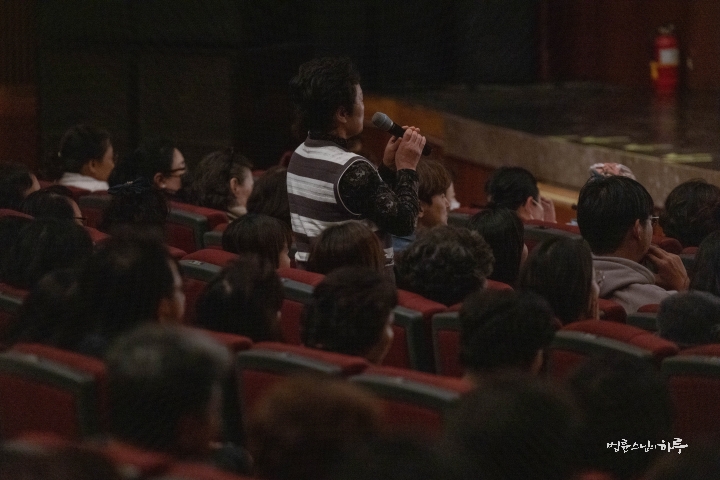
I’m Furious That My Husband Buys Too Many Second-Hand Items
Sunim listened to the questioner’s story and asked with a smile:
“Are you going to tell your entire life story today? So what’s your question?” (Everyone laughs)
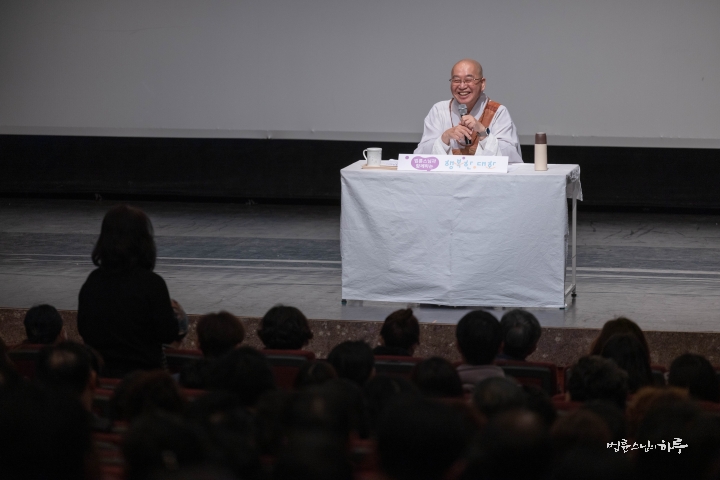
“It’s about my husband. (Everyone laughs) He buys too many second-hand items from Danggeun Market (Korean online second-hand marketplace). He buys so much that he could open up a store. Our tangerine warehouse is filled with wardrobes and bookshelves along the walls. One day, he bought a treadmill from Danggeun Market and asked me to help unload it from the truck. When we unloaded it, I saw it was very old and barely held together with blue tape. I got angry and asked how much he paid for it, and he said 50,000 won. I thought to myself that it would cost more than 50,000 won just to dispose of it, and I was furious. He only used it for exercise for three days before quitting. I’ve left it alone for five years now because if I say anything more, we’ll end up fighting.”
“Not everyone in the world can be to your liking. Even the spouse you love and married can’t be entirely to your liking. Did you marry your husband after dating, or was it an arranged marriage?”
“My husband’s younger sister and I were friends. My sister-in-law is my friend.”
“So you married your friend’s older brother. Anyway, when you got married, did your husband seem okay to you? Or did someone force you to marry him?”
“Even now, my friend says I’m suffering because I married her brother because of her.”
“Anyway, at that time, did your husband seem okay to you when you married him? Or did you marry him reluctantly even though you didn’t like him?”
“He seemed okay at the time, but I didn’t know he would be like this.”
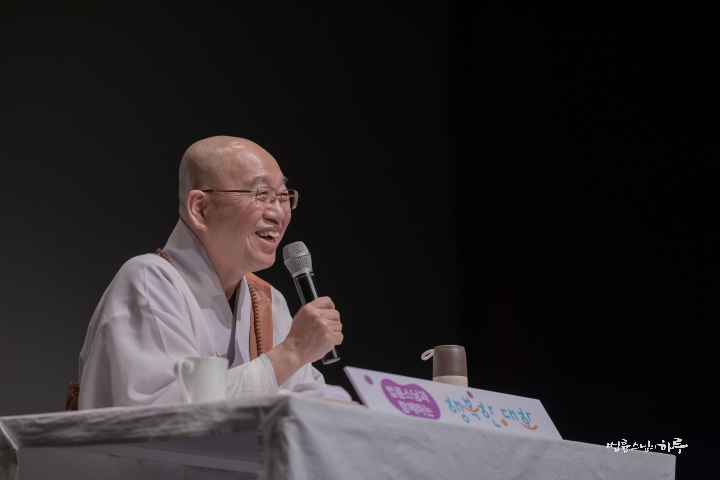
“So you married him because he seemed okay. You’ve mainly been growing tangerines until now. Has your husband been good at growing tangerines? Or has he made you suffer by doing it poorly?”
“To use an expression from Sunim’s dharma talk, my husband is like someone who carries a dung basket with only 20% filled and walks around leisurely, while I’m like someone who carries 80% and struggles along. We’ve never really gotten along well throughout our marriage.” (Everyone laughs)
“Who did I say was the wise person in my dharma talk?”
“According to Sunim’s dharma talk, I’m the fool.” (Everyone laughs)
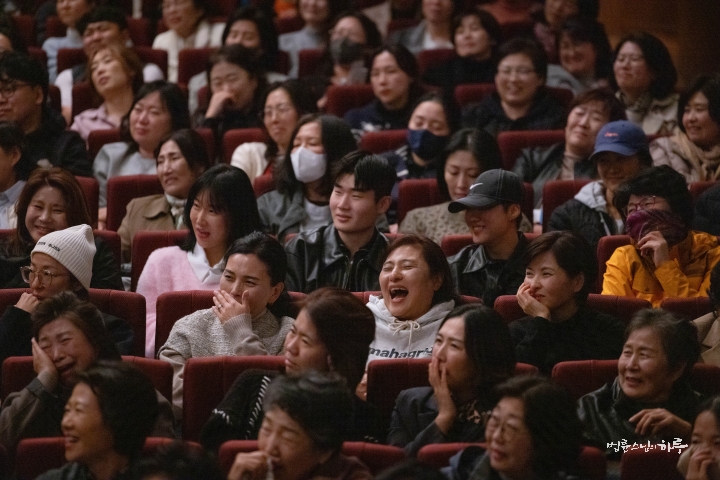
“One thing I learned while living with beggars is this. I would carry a dung basket filled 80% and struggle to move it, while the beggar would only fill it 20% and walk around leisurely. At first, I thought, ‘How can work be done like that?’ But when I fell ill and lay down to think about it, I realized there was some logic to the beggar’s behavior. The beggar told me that for manual laborers who work with their bodies, their body is their asset. Since no one will care if your body is sick, you have to protect your own body. The reason for working leisurely is, first, a way to protect your own body. Second, owners can’t stand to see the people they employ idling. No matter how hard you work, if the owner catches you resting for a moment, they’ll be displeased and wonder why you’re not working. If they knew your work style, they might understand that you’re just taking a short break after working hard, but since the owner can’t know everything about you, when they see you resting, it looks like you’re being lazy. But if you carry 80%, you can’t help but rest because it’s too hard. On the other hand, if you carry 20%, you can work continuously without resting, so to the owner, it looks like you’re working diligently all day. The beggar said it’s good for him because he can take care of his body, it looks good to the owner, and it’s good for both parties. Working hard like me only wears out your body, and if the owner sees you resting for a moment, they dislike seeing you idle and you fall out of favor, so both sides lose. When I first heard this, I thought he was saying such things because he was a beggar, but when I actually fell ill and couldn’t work for a few days, I realized there was some truth to what the beggar said. Similarly, isn’t it good for your husband’s health if he works steadily at a leisurely pace? You might not like it, but isn’t it better than not having a husband at all?”
“That’s right.”
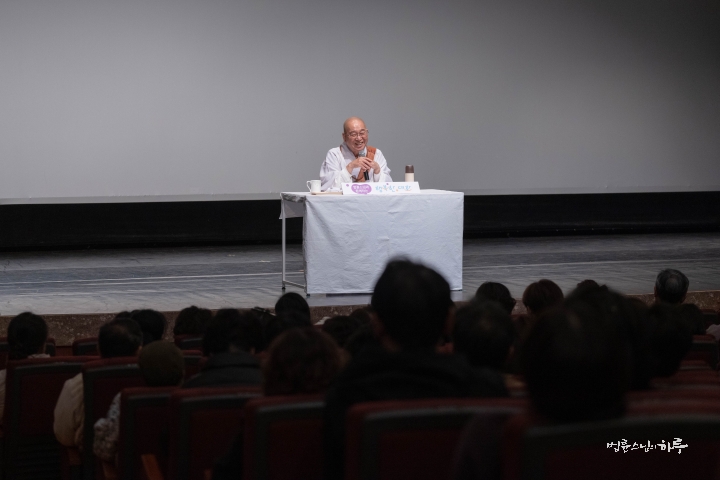
“Is your husband healthy?”
“He has high blood pressure, but he’s healthy. He bought the treadmill to manage his high blood pressure but only used it for three days before quitting.”
“Is your husband buying these second-hand items with money he earned? Or with money you earned?”
“He mostly buys them with money he earned himself.”
“Then isn’t it better to have something than nothing?”
“Yes, that’s right.”
“Is the amount he’s spending on these various used items from Danggeun Market enough to deplete your assets?”
“It’s not that much, but it’s frustrating to watch.”
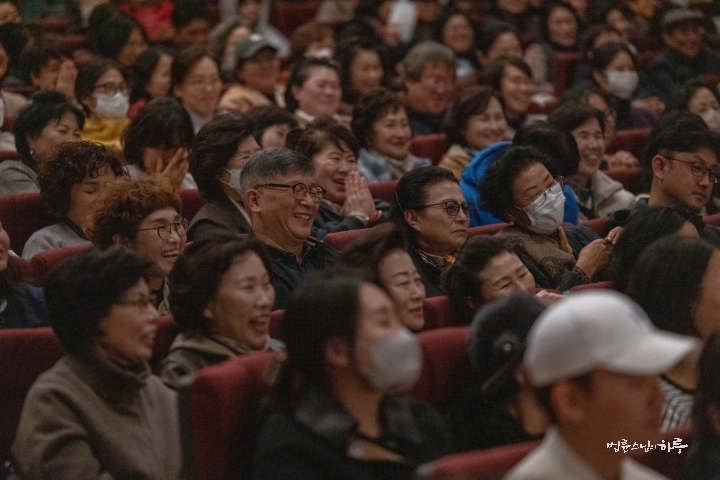
“I understand that you feel frustrated. But are you frustrated because your husband is buying second-hand items? Or are you frustrated because you can’t understand your husband?”
“That’s what I’m asking you, Sunim. How can I understand my husband?”
“When we see someone’s behavior and wonder why they’re acting that way, is it because we don’t understand that person? Or is it because that person doesn’t understand us?”
“It’s because I don’t understand the other person.”
“Then who feels frustrated?”
“I feel frustrated.”
“But if you understand and think, ‘Oh, that’s why my husband did that,’ whose mind will be at ease?”
“Yesterday morning, I saw that he had bought a long angle iron and put it on top of the treadmill. That’s why I’m so frustrated.”
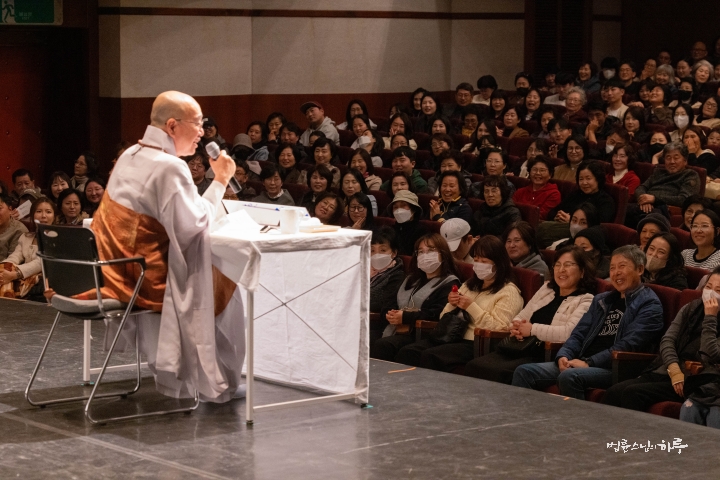
“Stop changing the subject and answer my question. You’ve been frustrated because you haven’t understood your husband until now, right? But if you come to understand your husband and think, ‘Oh, that’s why he behaved this way,’ will your husband’s mind feel at ease? Or will your mind feel at ease?”
“My mind will feel at ease.”
“Then why do you live feeling frustrated when you can live with your mind at ease?”
“Because I get furious when I see my husband.”
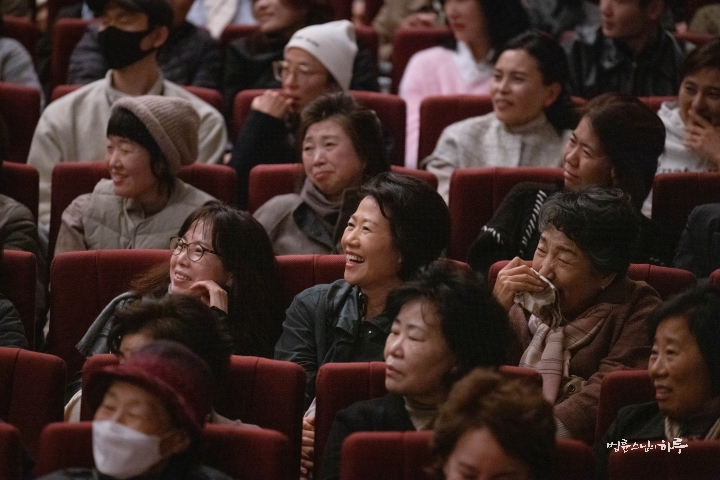
“Being furious means you don’t understand your husband’s behavior. You could look at the same behavior and think, ‘Oh, he’s saving money by buying used items.’ When you see him bringing in a treadmill, you could think, ‘He must be trying to take care of his health because he’s not feeling well lately.’ As the saying goes, ‘Good intentions last three days,’ he might have brought it intending to exercise but couldn’t keep it up.
‘It’s better to buy a used item for 50,000 won and not use it than to buy a new one for 1.5 million won and not use it.’
How about thinking like this? Even if he buys some used items, the loss isn’t that great.
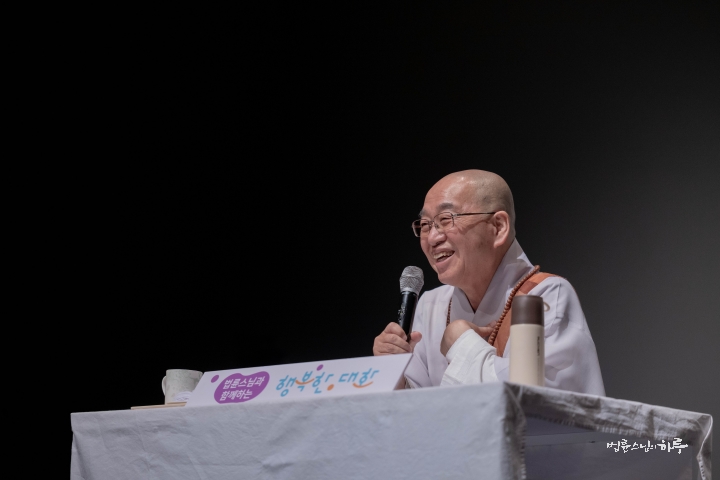
If it were a useful item, someone else would have quickly bought it before your husband’s turn came. The fact that your husband bought it means it’s a cheap item that no one else wanted. Even if it’s expensive, it’s only about 50,000 won, which is less than a day’s worth of alcohol for those who drink. It’s fortunate that he’s not drinking, cheating, or causing trouble elsewhere. He’s an admirable person for bringing home something that others have used and discarded, seeing value in it.
From a psychological perspective, it seems your husband might have grown up in poverty, which led to his tendency to dislike wasting things. I have a similar trait. Once, I found a bookshelf that someone had discarded on the street, brought it home, and used it. In my office, I’ve been using a table and chairs that others had discarded for 20 years now. Famous people whose names you’d recognize have sat in those chairs and conversed with me, and there’s been no problem at all. While people around me suggest throwing them away, I still find them usable. In today’s era of environmental crisis, people like your husband are admirable. Did you ask me this question because you wanted to brag about how your husband is so frugal with his belongings? (laughs)
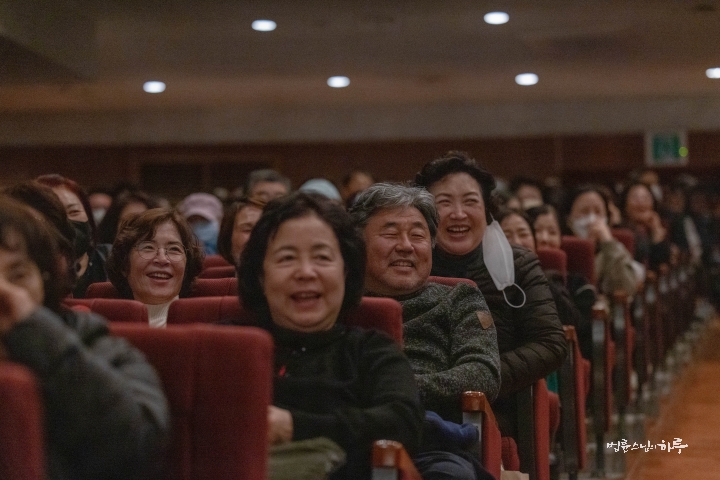
“Does my husband’s persistent habit of buying and hoarding used items, despite my countless nagging, mean I can change him? Or that I can’t?”
“It means you can’t change him.”
“If I can’t change him but keep trying, who suffers?”
“I suffer. Once, when I nagged him to stop buying used items, he got angry and threw a box of tangerines.”
“If you can’t change him anyway, wouldn’t it be less painful for you to just let it be? Whether you nag or not, he’ll still buy used items. You’ve only lost a box of tangerines by nagging. If you hadn’t nagged, he wouldn’t have thrown the tangerine box.”
“I cried when my husband threw the tangerine box. He usually carries tangerine boxes so carefully, as if they were eggs. Who in the world throws tangerine boxes like that?”
“Does your husband, who grew the tangerines himself, know how precious they are? Or not?”
“He knows.”
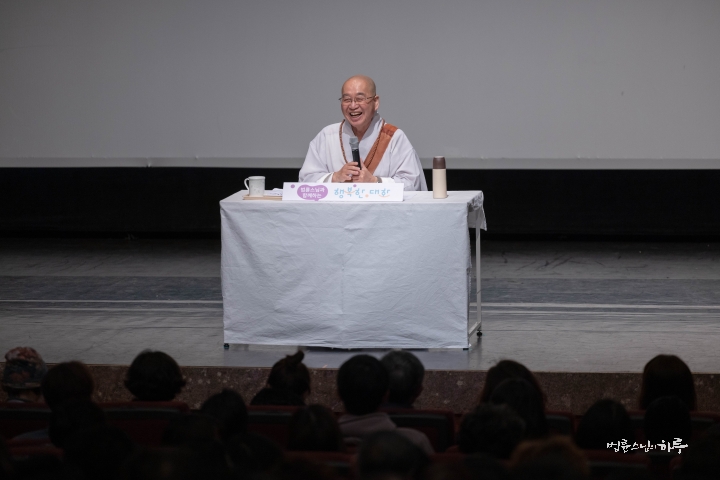
“When he threw those precious tangerines, it shows how angry he was. If he was that angry, shouldn’t he have slapped his wife who made him so mad? But he couldn’t bring himself to hit his wife, so he threw the precious tangerines instead. Shouldn’t you be grateful that he threw the tangerines? Instead of protesting how he could throw such precious tangerines, try saying this:
‘Oh, honey. You threw the tangerine box because you couldn’t hit me. Thank you for thinking of me even when you were so angry.’
That’s the truth. No matter how precious the tangerines are, they’re less precious than his wife, so he threw the tangerine box. He wanted to hit his wife, but since he couldn’t bring himself to do it, he broke something his wife cherishes, like a dish. He’s venting his emotions by breaking something his wife values. He can’t hit his wife, so he breaks an innocent dish instead. Instead of arguing, ‘What did the dish do wrong? Why break such a precious dish?’ think humorously, ‘He’s breaking the dish because he cares for his wife.’ That’s actually the truth. When people want to hit someone but can’t, they throw something else. If you could think, ‘He still loves me. Even when he’s so angry, he’s thinking of me’ when he throws the tangerine box, you’d be so grateful to your husband you might cry. You’ve never thought of it this way, have you?”
“No, I haven’t.”
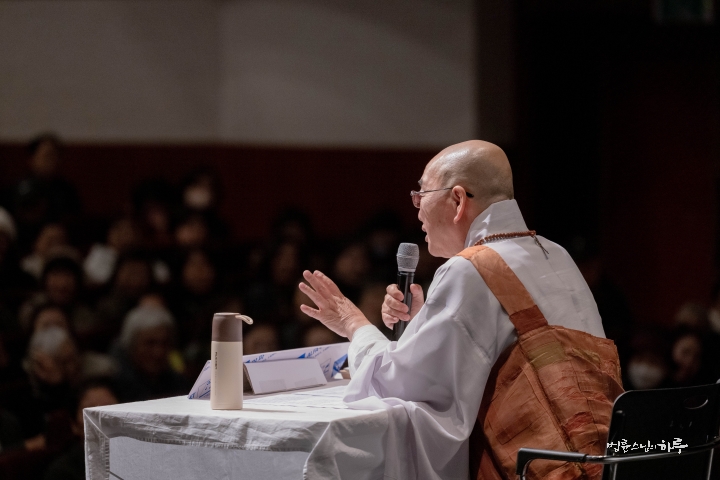
“You’re only focused on the tangerines. Just like how you only thought about how hard it was to care for your sick mother-in-law, but after hearing a Dharma talk, your perspective changed to ‘Isn’t it harder for my mother-in-law who can’t control her bodily functions than for me who has to clean up after her?’ Try to change your mindset about your husband throwing precious tangerines: ‘He threw the precious tangerines because he couldn’t bring himself to hit me. Even in his anger, he threw the tangerines because I’m more precious than them.’ If the tangerines were more precious, he would have hit you instead of throwing them, right? You need to change your perspective like this. You can’t change your husband. How old is he?”
“He’ll be seventy the day after tomorrow.”
“At that age, it’s difficult for him to change. As long as buying used items isn’t causing significant financial harm, try to be understanding of your husband.”
“I understand. Thank you.”
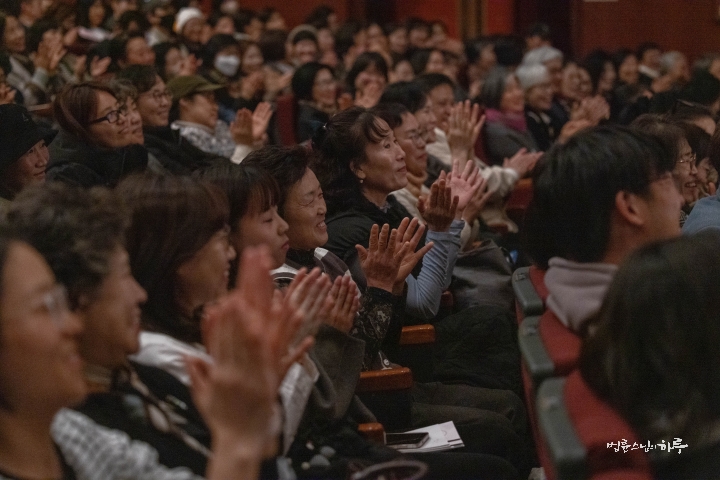
The questions continued to come.
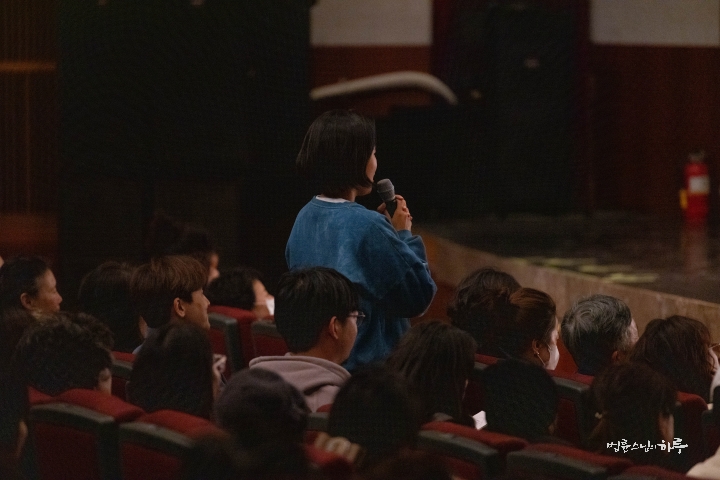
• I work a regular job and do part-time work on holidays, but I’m still far from zeroing out my overdraft account. How can I change my mindset from feeling poor to feeling wealthy?
• Someone I met in an exercise group keeps telling obvious lies. I’m embarrassed because my dislike shows on my face. How can I change my feelings of dislike?
• I recently found out that my husband has been having an affair for over two years. Every day feels like walking on thorns, and we fight daily. What should I do?
• As a student, I experienced my first major failure in life by not getting into the school I wanted. How can I avoid feeling discouraged?
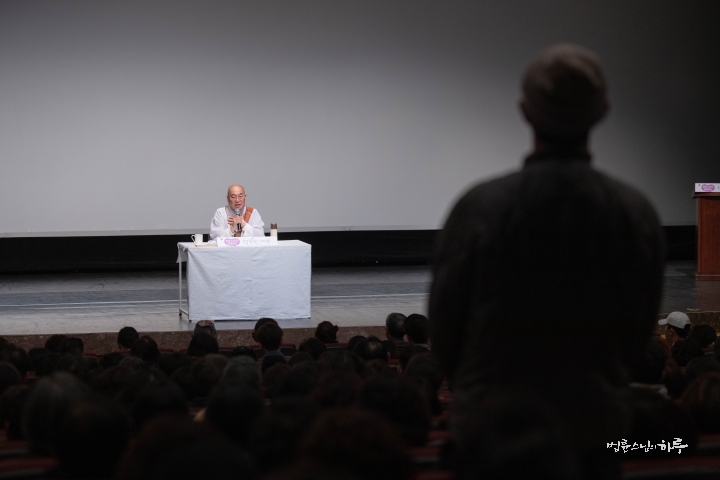
After taking three more questions from the audience, it was almost 10 PM.
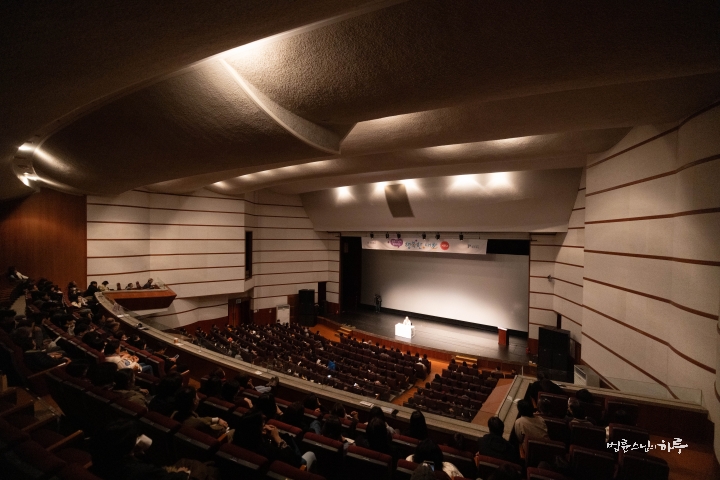
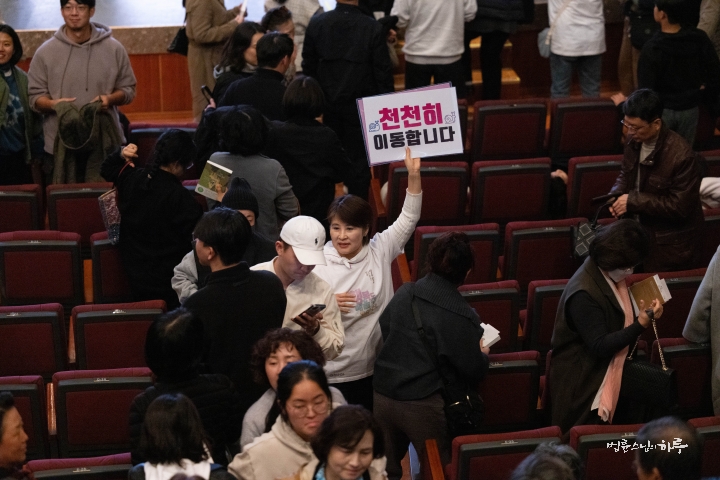
After the lecture, Sunim immediately held a book signing session on stage. Many citizens lined up to greet Sunim and express their gratitude.
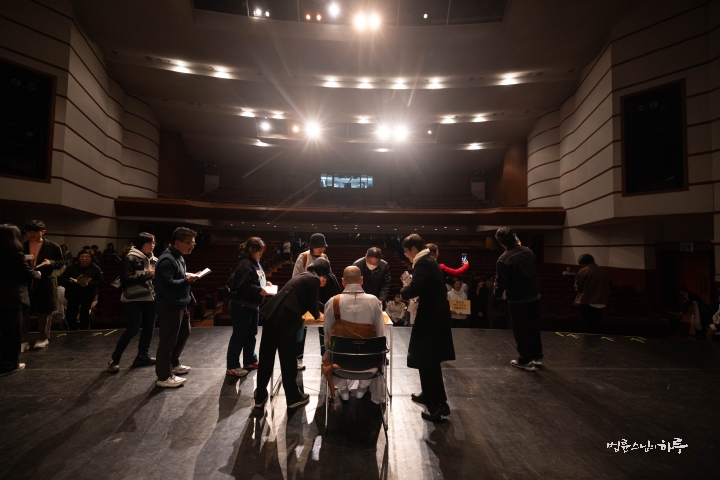
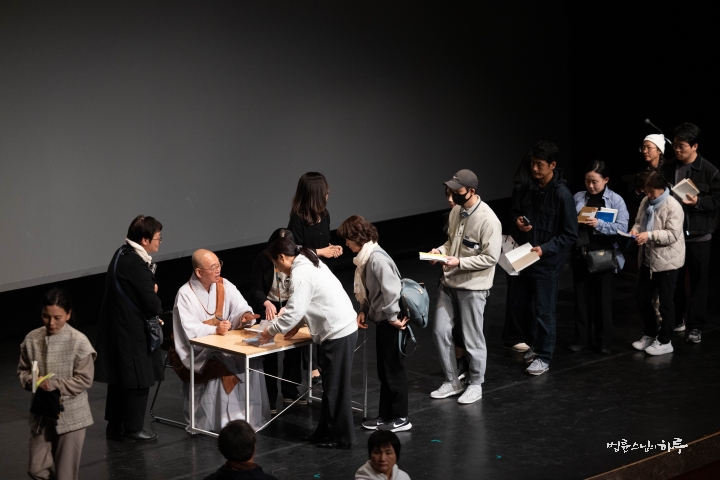
“Thanks to you, Sunim, I’ve become much happier. Thank you for coming all the way to Jeju.”
After the book signing, Sunim took a commemorative photo with the volunteers who prepared the lecture.
“Happy citizens, Jeju!”
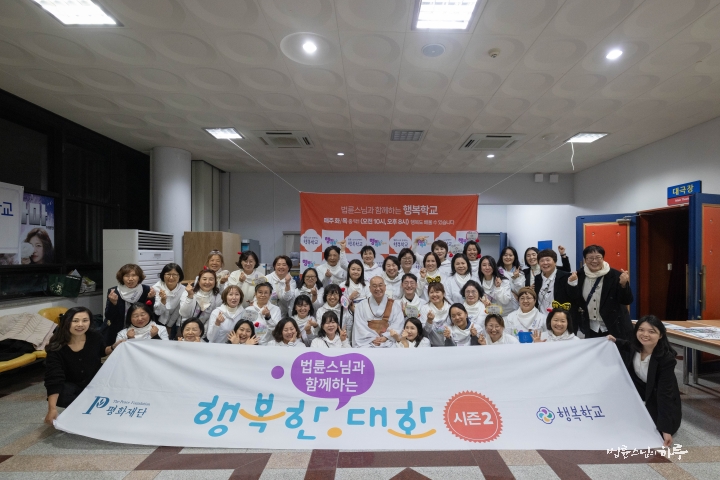
Sunim expressed his gratitude to the volunteers. He left the lecture hall and headed to his accommodation.

Arriving at the accommodation at 11 PM, Sunim had a late dinner and concluded the day’s schedule.
Tomorrow, he will depart early from Jeju Airport, arrive at Daegu Airport, and then immediately move to Gyeongju. He is scheduled to spend the entire day with employees of the Korea National Park Service, touring Gyeongju Namsan and engaging in conversations.




